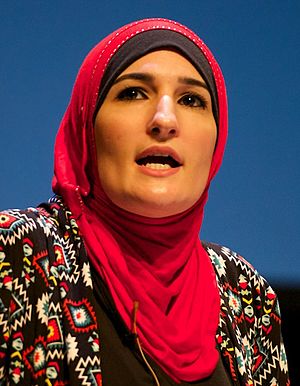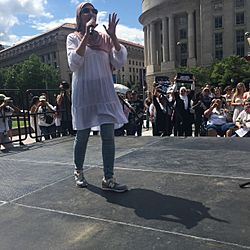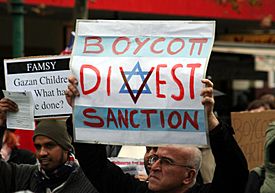Linda Sarsour facts for kids
Quick facts for kids
Linda Sarsour
|
|
|---|---|

Sarsour in 2016
|
|
| Born | 1980 (age 45–46) New York City, U.S.
|
| Alma mater | |
| Occupation |
|
| Known for | Co-chair of the 2017 Women's March |
Linda Sarsour (born in 1980) is an American activist. She is known for her work on civil rights and social justice. She helped lead the 2017 Women's March and the 2019 Women's March. She also used to be the head of the Arab American Association of New York.
Sarsour is a Muslim woman with Palestinian roots. She first became known for speaking out against police surveillance of American Muslims. Later, she worked on other important issues like police brutality, feminism, and immigration policy. She also helped organize Black Lives Matter protests.
Her work has been praised by many people who support social change. However, her views on the Israeli–Palestinian conflict have also led to some criticism. In 2017, Time magazine named her one of the "100 Most Influential People" because of her role in the Women's March.
Early Life and Education
Linda Sarsour was born in Brooklyn, New York. She was the oldest of seven children. Her parents were immigrants from Palestine. Her father owned a small shop in Crown Heights, Brooklyn.
She grew up in Sunset Park, Brooklyn. After high school, she went to Kingsborough Community College and Brooklyn College. She wanted to become an English teacher.
Political Activism
Linda Sarsour has been an activist for many years. She works to make sure everyone has fair treatment and equal rights.
Arab American Association of New York
After the September 11 attacks, Sarsour began working for the civil rights of American Muslims. She volunteered for the Arab American Association of New York. The founder, Basemah Atweh, became her mentor.
In 2005, Basemah Atweh passed away. Linda Sarsour, at age 25, was chosen to lead the association. She helped the organization grow a lot.
Sarsour became known for protesting how police watched Muslim communities. She helped pass a law in New York called the Community Safety Act. This law created a group to check police actions and stop unfair profiling. She also helped make Islamic holidays like Eid al-Adha and Eid al-Fitr recognized in New York City public schools.
Many people see Sarsour as a symbol of strength for Muslim women. She believes wearing a hijab is a spiritual choice, not a sign of being controlled. She has also spoken about the challenges Muslim women who wear hijabs face in Western countries.
Black Lives Matter
Linda Sarsour has been a strong supporter of the Black Lives Matter movement. After the shooting of Michael Brown in 2014, she helped organize protests. She also helped create "Muslims for Ferguson."
She traveled to Ferguson, Missouri, to join other activists. Since then, she has continued to work closely with Black Lives Matter. She often speaks at their events and on television about feminism and civil rights.
Involvement in Politics
Sarsour is a member of the Democratic Socialists of America. In 2016, she supported U.S. Senator Bernie Sanders during his presidential campaign.
In 2012, the White House recognized Sarsour as a "Champion of Change." This award honored her work in the community.
Women's March Leadership
2017 Women's March

Linda Sarsour was asked to be a co-chair for the 2017 Women's March. This big event happened the day after Donald Trump became president. Sarsour was seen as a key leader in speaking out against some of Trump's policies.
She strongly opposed the Trump administration's ban on travelers from several Muslim-majority countries. She was the main person in a lawsuit against this travel ban. The lawsuit argued that the ban was unfair to Muslims.
After the march, Sarsour faced many threats and false reports online. Despite this, many people supported her using the hashtag #IMarchWithLinda. She and the other co-chairs of the Women's March were named among Time magazine's "100 Most Influential People" in 2017.
Sarsour also helped organize the 2017 Day Without a Woman protest. She was arrested during a protest outside the Trump International Hotel in New York City. She has also protested other actions by the Trump administration, such as ending the DACA program for young immigrants.
2019 Women's March
In 2018, Sarsour announced she would help lead the 2019 Women's March in Washington. She stepped down from the Women's March organization in September 2019.
Views on Israeli–Palestinian Conflict
Linda Sarsour is well-known for speaking up for Palestinians in the Israeli-occupied territories. She has said she supports a solution where Israelis and Palestinians can live together peacefully and fairly. She does not support groups like Hamas.

Sarsour supports the Boycott, Divestment, Sanctions (BDS) campaign against Israel. She believes that people who support women's rights should also care about the rights of Palestinian women. She has said that Israel's Jewish nation-state law suggests that Jewish people are more important than others, which she disagrees with.
Working with Jewish-American Groups
Sarsour has worked with some Jewish groups that share her views on social justice. These include Jewish Voice for Peace and Jews for Racial and Economic Justice. However, some other Jewish organizations have criticized her because of her views on Israel.
Fundraising Efforts
Linda Sarsour has also helped raise money for important causes. In 2017, after a Jewish cemetery in St. Louis was damaged, she worked with other Muslim activists to raise money for repairs. They also helped a Jewish cemetery in Colorado.
She also helped raise money for victims of Hurricane Harvey and the 2018 Pittsburgh synagogue shooting. These efforts show her commitment to helping different communities in need.
Personal Life
As of 2011, Linda Sarsour lives in Bay Ridge, Brooklyn. She had an arranged marriage at age 17 and has three children. Her family and her husband's family are from the Palestinian city of Al-Bireh in the West Bank.
Sarsour is a Muslim. She believes her religion empowers women. She chooses to wear a hijab, which she says helps people know she is Muslim. She also believes that Muslims must follow the laws of the country they live in.
Images for kids
See also
 In Spanish: Linda Sarsour para niños
In Spanish: Linda Sarsour para niños
 | Selma Burke |
 | Pauline Powell Burns |
 | Frederick J. Brown |
 | Robert Blackburn |


